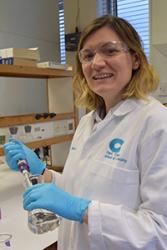Student work to contribute to challenging sepsis
Rates of sepsis are on the increase. This rare but serious complication which can happen as a result of an infection can be life- threatening.
One chemistry student is hoping that her research work will contribute to the fight against this infection.
 PhD student Alice Heeroma at work at one of the School of Chemistry's labs.Alice Heeroma, from Felixstowe, is studying for a Doctorate in Chemistry with Dr Gwenin and Dr Jones at Bangor University in Wales. Twenty-three year old Alice is a former pupil of the current Felixstowe Academy. She is in the first year of her research which should contribute to the creation of a rapid test for sepsis.
PhD student Alice Heeroma at work at one of the School of Chemistry's labs.Alice Heeroma, from Felixstowe, is studying for a Doctorate in Chemistry with Dr Gwenin and Dr Jones at Bangor University in Wales. Twenty-three year old Alice is a former pupil of the current Felixstowe Academy. She is in the first year of her research which should contribute to the creation of a rapid test for sepsis.
Sepsis, the body’s over-reaction to an infection, when the body attacks its own organs or tissue, can strike very quickly, but current tests take within 2-5 days to deliver positive identification, by which time the patient can be facing a serious battle. Sepsis can lead to multiple organ failure, septic shock and organ damage as well as loss of life.
Alice says that the two practical projects, which also had a very real and valuable application, have provided her with valuable technical and practical experience for her research Project. During her undergraduate projects, Alice created organic microstructures which can be used in drug delivery as well as a range of other industrial applications and contributed to work to develop peptoids to be used to prevent premature births.
She says:
“The practical projects we carried out at Bangor University have put me in a good position to begin my PhD research straight away. Had I followed an undergraduate degree which didn’t offer a practical project, I’d now be spending time learning lab techniques at the beginning of my research PhD. These are also skills that I have acquired are also the transferrable skills that employers are looking for if you want a career in a lab.”
“I’m really hoping that my work will make a difference, by contributing to the development of a hand- held rapid identification tool for sepsis,” she added.
Alice’s PhD is sponsored by CALIN, the Celtic advances Life-Sciences Innovation Network for Welsh and Irish businesses, part-funded by the European Regional Development Fund through the Welsh Government. University College Cork are also working on the project with north Wales company, SOPHIMARK. The project has developed out of previous work between Bangor University and the company.
Publication date: 8 February 2018
